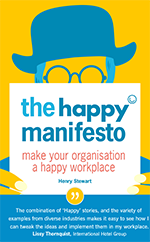SouthWest Airlines - putting your people first makes good business sense
The annual UK Servant-Leadership conference this month was an inspiring event. This movement is based around the idea, first promoted by Robert Greenleaf, that your purpose as a leader or manager is to serve your people.
One example of how this makes simple business sense is SouthWest Airlines, which is clear in its commitment to Servant Leadership. Now the third largest airline in the world, Its record of 40 consecutive years of profitability (unique in the US airline industry) is based on founder Herb Kelleher’s philosophy:
Hi, we are Happy
We are leading a movement to create happy, empowered and productive workplaces.
How can we help you and your people to find joy in at least 80% of your work?
Put your employees first
“Your employees come first. There’s no question about that. If your employees are satisfied and happy and inspired by what they are doing, then they make your customers happy and they come back.”
“We tell our people, ‘Don’t worry about profit. Think about customer service.’ Profit is a by-product of customer service.”
A philosophy like this is tested in hard times and SouthWest was notable for being the only US airline not to lay off staff after 9/11. They sold off planes instead.
Most profitable and one of the most unionised
In the UK, BA has often faced confrontation with its staff and Ryanair is hostile to the very concept of trade unions. Yet SouthWest Airlines is 82% unionised, one of the highest levels of any airline in the US. Herb’s people-based philosophy extended to treating the unions as partners.
A US trade union web site notes that SouthWest has “the best relationship with its unions, and the highest customer satisfaction ratings”. In 2008 the Transport Workers Union made Herb an honorary lifetime member “in grateful appreciation for [his] unparalleled Leadership in creating a magnificent airline and a generation of Employees who love coming to work.”
That is a remarkable tribute to a remarkable businessman, and to the philosophy that lay behind his approach. Imagine how different large parts of British business would be if they had the same approach to their people and to the unions that represent them.
How would your organisation be different if, like SouthWest, the key focus of management was on making sure your people were “satisfied and happy and inspired”?
Note: My thanks to John Noble, the remarkable and dedicated organiser of the Greenleaf Centre in the UK, for his presentation, which included this information on SouthWest Airlines.
Keep informed about happy workplaces
Sign up to Henry's monthly Happy Manifesto newsletter, full of tips and inspiration to help you to create a happy, engaged workplace.

Learn the 10 core principles to create a happy and productive workplace in Henry Stewart's book, The Happy Manifesto.
Henry's Most Popular Blogs
- 8 Companies That Celebrate Mistakes
- 9 Benefits of Having Happy Employees
- 321Zero: How I Solved my Email Overload
- 16 Companies That Don't Have Managers
- 5 Big Companies Who Swear by Mindfulness
- 49 Steps to a Happy Workplace
- A Four Day Week? Let's Start With a Four Day August
- Google: Hire Great People and Give Them Lots of Autonomy
- Buurtzorg: No Managers, Just Great Care From a Nurse-Led Service
- 30 Steps to Joy at Work: Get More Done by Being Less Busy

Henry Stewart, Founder and Chief Happiness Officer
Henry is founder and Chief Happiness Officer of Happy Ltd, originally set up as Happy Computers in 1987. Inspired by Ricardo Semler’s book Maverick, he has built a company which has won multiple awards for some of the best customer service in the country and being one of the UK’s best places to work.
Henry was listed in the Guru Radar of the Thinkers 50 list of the most influential management thinkers in the world. "He is one of the thinkers who we believe will shape the future of business," explained list compiler Stuart Crainer.
His first book, Relax, was published in 2009. His second book, the Happy Manifesto, was published in 2013 and was short-listed for Business Book of the Year.
You can find Henry on LinkedIn and follow @happyhenry on Twitter.